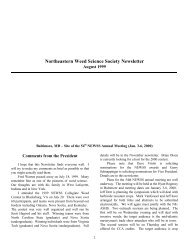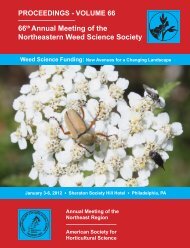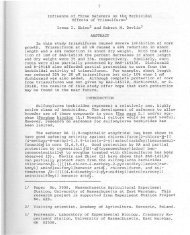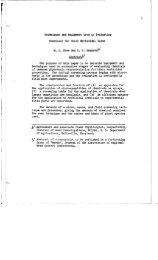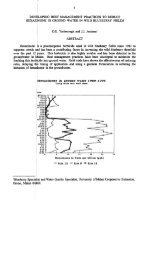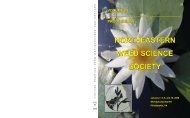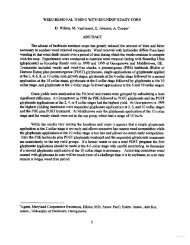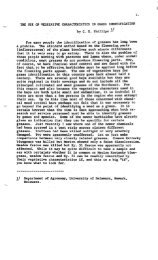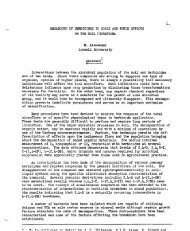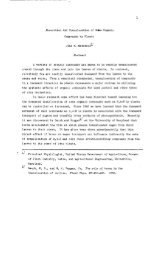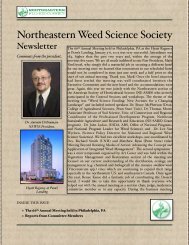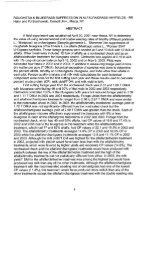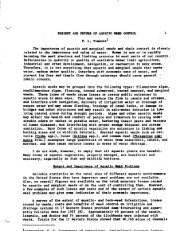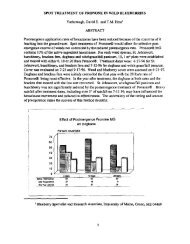Proceedings of the Sixty-first Annual Meeting of the Northeastern ...
Proceedings of the Sixty-first Annual Meeting of the Northeastern ...
Proceedings of the Sixty-first Annual Meeting of the Northeastern ...
You also want an ePaper? Increase the reach of your titles
YUMPU automatically turns print PDFs into web optimized ePapers that Google loves.
182<br />
b. Legislative Visits training course- Lee explained that <strong>the</strong> Invasive Species<br />
Awareness Coalition that organizes NIWAW and is chaired by Nelroy Jackson has<br />
been busy planning NIWAW 7. This year will include a more unified legislative focus<br />
with an <strong>of</strong>ficial NIWAW position on several key issues. Part <strong>of</strong> this legislative push<br />
will include organized Congressional visits by key NIWAW participants that target<br />
House and Senate committees which deal with invasive weed policy and funding. In<br />
addition Lee said that he has led two on-line training courses titled “Legislative Visits<br />
101: Making your visit count” and will conduct <strong>the</strong> third and final session on Jan. 23,<br />
2005 at 4 PM (ET). More information can be found at:<br />
http://www.nawma.org/niwaw/niwaw_index.htm<br />
2. Work with <strong>the</strong> USDA-ARS to adopt Weed Science as a Federal job series<br />
a. Congressional Letter to OPM – Lee said <strong>the</strong> Office <strong>of</strong> Personal Management has not<br />
responded to past requests from Rob Hedberg and is working with Hilda Diaz-<br />
Soltero on this. Lee thought that Congressional action may be needed in <strong>the</strong> form <strong>of</strong><br />
a letter to OPM that is signed by key Representatives and Senators. Lee is working<br />
on drafting this letter and plans to make visits to “<strong>the</strong> Hill” to garner support.<br />
3. Expand <strong>the</strong> WSSA’s participation and recognition within <strong>the</strong> EPA.<br />
a. Discussion <strong>of</strong> meeting with Don Stubbs, Associate Administrator with EPA Office <strong>of</strong><br />
Pesticide Policy. Lee and John Jachetta discussed <strong>the</strong> results from <strong>the</strong>ir recent<br />
meeting with Don Stubbs. EPA is looking for info on Rangeland and R-O-W<br />
expertise. Lars Anderson said we should invite WSSA members with this type <strong>of</strong><br />
expertise to DC for periodic seminars on <strong>the</strong>se topics. John Jachetta said we need<br />
to make sure to invite EPA employees to NIWAW. John mentioned ano<strong>the</strong>r topic<br />
could be application technology and how to assess spray drift in urban areas. Since<br />
<strong>the</strong>n, we have tentatively scheduled a seminar at EPA on March 2, 2006 with one or<br />
two weed scientists to talk about rangeland and R-O-W issues.<br />
b. Conducting EPA field visits, and reciprocal expert visits to DC. Lars Anderson<br />
mentioned <strong>the</strong> success <strong>of</strong> his 2 week tour in <strong>the</strong> west with EPA employees. John<br />
Jachetta said we could also be effective by organizing a small trip where an EPA<br />
employee spends a week at a University or with an Extension Agent. O<strong>the</strong>r<br />
suggestions included forming a small discussion group at <strong>the</strong> WSSA meeting in New<br />
York with EPA <strong>of</strong>ficials that will be attending and to use commodity groups as a<br />
vehicle to get EPA involved. Lee has invited Don Stubbs and Kurt Getsinger to meet<br />
with <strong>the</strong> WSSA Board in New York as well as participate in <strong>the</strong> WSSA WLC meeting.<br />
c. John Jachetta said that we need to discuss some <strong>of</strong> <strong>the</strong>se ideas when Carol Mallory-<br />
Smith is in DC at <strong>the</strong> end <strong>of</strong> Nov. Lee will organize a meeting with Carol, John, and<br />
himself and EPA’s Don Stubbs and Lois Rossi. Since <strong>the</strong>n, Carol and John were not<br />
able to travel to DC in Nov, but Lee still met with Don Stubbs.<br />
4. Increase Weed Science research funding opportunities.<br />
Focus <strong>of</strong> USDA’s Biology <strong>of</strong> Weedy and Invasive Plant NRI Program. Several people<br />
were deeply concerned about <strong>the</strong> direction <strong>of</strong> this NRI Grant program. This year’s grant<br />
program now includes all invasive species (e.g., not just plants). Jill said that when she<br />
was panel manager several years ago, <strong>the</strong>y had expanded <strong>the</strong> grant program to Invasive<br />
Plants because <strong>of</strong> <strong>the</strong> poor submission rate from Weed Biology. She thinks this may be<br />
<strong>the</strong> case again; however Michael Bowers, <strong>the</strong> new CSREES Program Leader for<br />
Ecology, has said that <strong>the</strong> only way to get more funding dollars is to change what you<br />
164



